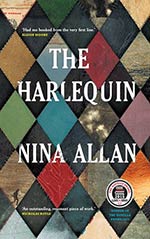
![]() couchtomoon
couchtomoon
1/22/2016
![]()
Once upon a demobilization...
Released in 2015 by Sandstone Press after winning The Novella Award competition, Nina Allan'sThe Harlequin follows a war medic upon his physical and psychological return home to London at the end of The Great War. Haunted by specters of his past and present, Beaumont struggles to adjust to a life that no longer fits, (if it ever did), never fully aware of just how close he is to the edge.
Desirous to consume more of Nina Allan's fiction after being blown away by her 2014 award shortlist darling, the diaphanous and anhedonic The Race, I was thrilled to see another release from her so soon. The Harlequin is a grim and somber novella that defies labels of horror, SF, and realism, while at the same time invoking all of those senses. One of the finest writers in SF today, Allan has this way of getting into the heads of her characters, of exploring completely and compactly, and, like The Race, The Harlequin toys with the reader's impressions while also toying with the fictions of reality. Unlike The Race, Allan's approach in The Harlequin teeters on the edge horror, gently brutal and brutally gentle, and the novella form provides a more traditional shape than its reality-seeping predecessor.
Longtime SF fans might wonder if, based on the title, this novella has any interaction with Harlan Ellison's famous (and truly delightful) short story, "'Repent, Harlequin!' Said the Ticktockman." Probably not -- well, maybe only slightly, with its undercurrent of a tick-tock-like nightmare stalking the protagonist as a gaudy Harlequin figure, more like a bomb than a punchcard, though. Actually, The Harlequin's feel and arc is more like the Pulitzer-winning Beloved (1987) by Toni Morrison. Like wine and cheese, or tea and biscuits, I sometimes manage--unintentionally-- to pair complementary new books with old books, as was the case with The Harlequin and Beloved. An unintuitive pairing at first -- not one that jumps off the shelves holding hands -- but upon finishing both, I realize they have more in common than I ever would have guessed.
Like the Pulitzer-winning Beloved, The Harlequin is inspired by a systemic, human-driven, global ordeal (American slavery inBeloved, WWI in The Harlequin), where the underlying mechanics of the story is driven by cultural trauma, by way of an isolated depiction of an individual's horrific, yet conceivable, psychological reaction to that trauma. Both tales explore the descent into madness through the distressful circumstances of their antihero protagonists; two traumatized people who couldn't be more different, yet who are driven to their behaviors by psychological forces, haunted by memories embodied as ghosts, incongruous with reality, yet weighty all the same. Surrounded by a community struggling with the same events in their own unique ways, while helping and hindering one another, the protagonists are isolated in their struggles, while representing greater society as a whole. Both novels dabble in the realms of magic realism and psychological horror, yet do so with such internal precision that they foster empathy, rather than cheap shock or gimmickry.
Where the novels stray from one another in tone is just as enlightening. Where Beloved has the emotional power of a cannonball to the heart (with cannonball metaphors that are as unsubtle as can be while still qualifying as metaphors), The Harlequin takes up that strange, yet entrancing, emotional stoicism that seems to be Allan's signature move, fostering that sense of alienation that attracts SF readers looking for something different and special, another peek beneath the veil.
http://couchtomoon.wordpress.com